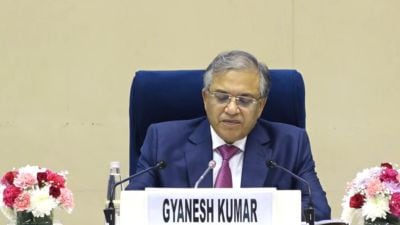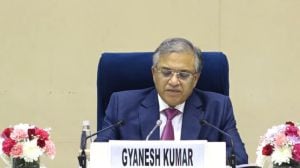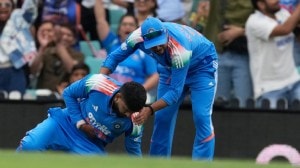37 die in Maoist terror, in Delhi Koirala tells Govt to work on King
In their biggest strike against civilians since the start of insurgency 10 years ago, Nepal Maoists today set off a landmine which ripped ap...

In their biggest strike against civilians since the start of insurgency 10 years ago, Nepal Maoists today set off a landmine which ripped apart a packed bus, killing at least 37 people and leaving 17 seriously wounded.
The explosion took place in Mudhekhola in Chitwan district, some 170 km south west of Kathmandu.
The attack comes at a time when Maoists, branded as terrorists by the governments of Nepal and India, are believed to be in Delhi, exploring possible dialogue with Nepal’s mainstream political party leaders on how to broadbase the opposition to the King.
Political parties have been insisting that Maoists abjure violence if there is to be a common platform against the royal takeover of Nepal on February 1.
In New Delhi today, former Nepal Prime Minister Girija Prasad Koirala met Defence Minister Pranab Mukherjee and asked him not to sell any military hardware to Kathmandu unless multi-party democracy is restored in the kingdom.
After King Gyanendra declared a state of emergency on February 1, New Delhi froze arms supply but announced resumption of non-lethal material supply on May 10.
According to government sources, the RNA will also soon receive bullet-proof jackets and hand-held thermal imagers, currently packed in boxes and stored at the Indian Embassy in Kathmandu. Though New Delhi insists that Kathmandu will get non-lethal supplies first, the long list of items sent to the Finance Ministry for an excise waiver include night vision devices.
At the 45-minute meeting with Koirala, who’s also president of the Nepali Congress, Mukherjee said that the supply of arms to Nepal was under constant review. He also reiterated India’s consistent stand that to deal with the political and economic challenges which Nepal faced, it was imperative that the political parties and the monarchy work together to evolve a broad national consensus.
However, the need to move on with bilateral ties is evident: soon after New Delhi’s decision last month to resume supplies to Kathmandu, Army chief Gen J J Singh spoke to his counterpart in Kathmandu Gen Pyaar Jung Thapa and conveyed to him the need for both sides to concentrate on restoring bilateral ties.
Koirala, who arrived here on Saturday, told Mukherjee that New Delhi needed to maintain pressure on King Gyanendra. Koirala, now 82, spent two months under house arrest after the February 1 royal takeover.
According to a Ministry spokesperson, Mukherjee conveyed India’s appreciation over the role Koirala had played in bringing together the seven mainstream parties on an agreed platform for an eventual political settlement based on multi-party democracy and constitutional monarchy. When he was released, he began to mobilise forces for an agitation against the King.
Koirala, a patient of acute bronchitis, in here for a medical check-up at the Apollo Hospital, and is also expected to meet Prime Minister Manmohan Singh, UPA chairperson Sonia Gandhi and External Affairs Minister K Natwar Singh.
—(With ENS in New Delhi)



- 01
- 02
- 03
- 04
- 05




























